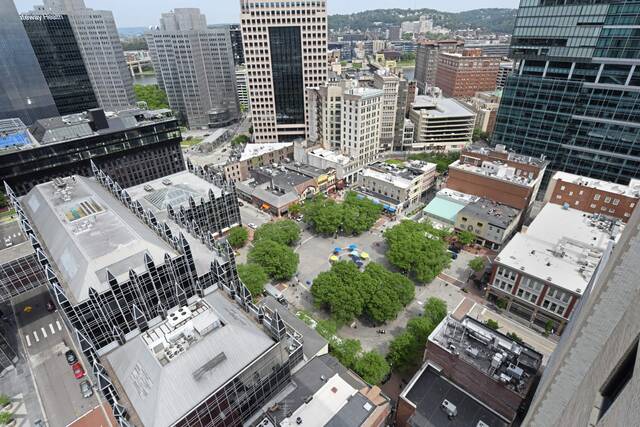Pittsburgh officials are looking to expand a program that aims to make it easier for delivery drivers and others to find on-street parking spots outside of local businesses.
The pilot program, unveiled in the spring, was originally scheduled to last for one year. Legislation introduced to City Council on Monday would extend it for three years.
The city’s Department of Mobility and Infrastructure has been awarded a $3.8 million federal grant to fund the initiative, according to the legislation.
The smart loading zone program was launched with a $100,0000 grant from Los Angeles-based Automotus. It allows delivery drivers for companies such as Door Dash, Uber Eats and Amazon to use designated parking zones for short-term parking.
To encourage people not to linger in the spot, the smart loading zones use a graduated payment system. It costs 7 cents a minute to park in one of the designated zones for the first five minutes and increases to 27 cents a minute for cars that park between 30 and 60 minutes.
The idea is to discourage people who plan to park for longer periods of time, leaving the spots open for delivery drivers who need to use them for only a few minutes.
The program came as such delivery services have become ubiquitous in recent years, city officials said when they launched the program.
Drivers who work for companies such as Amazon or Door Dash can scan a QR code displayed on signs at the smart loading zones. They enter information including their license plate numbers, payment method and company. Once they’ve registered, drivers will be able to park and automatically pay at designated smart loading zone spots without having to stop to pay a meter.
Cameras monitoring the spots automatically charge vehicles by reading license plates. When cars that park in the spots aren’t registered, the system automatically sends a bill to the address associated with the plate number.
The pilot has successfully launched 20 smart loading zones with the automated payment system since the initiative began in April, according to the legislation.
Preliminary data from the pilot shows “decreased average park times and decreased incidents of double parks, which results in improved optimization of curb usage,” the legislation said.
The legislation calls for an extension of the program so the city can gather more information about the impacts of the smart loading zones and use the U.S. Department of Energy grant funding provided for the initiative.
The measure was introduced to City Council without discussion on Monday. Council could take a preliminary vote as early as next week, with final approval as soon as the following week.








